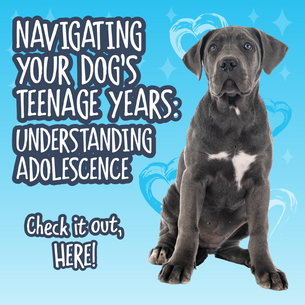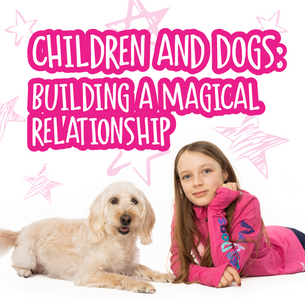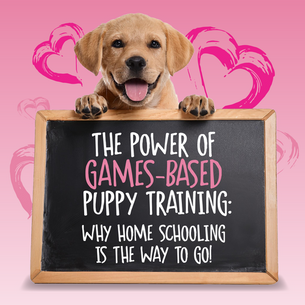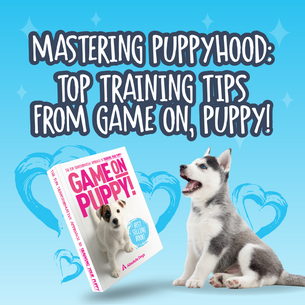As any dog owner knows, raising a happy, well-behaved puppy isn’t always plain sailing. From toilet disasters to chewed slippers, puppies come with their fair share of challenges. They also have certain needs that need to be met in order to help them thrive.
Join us as we share six essential strategies for raising a happy, healthy puppy.
1. Relationship Success: Building Trust and Connection
A strong relationship with your puppy is the foundation of effective training.
Think of your relationship with your puppy like a bank account, where positive interactions are deposits, and negative ones are withdrawals. Every time you reward your puppy for doing something right, you're making a deposit, reinforcing your relationship and showing them that being with you is fun and rewarding. On the other hand, if you get frustrated and scold them, you're making a withdrawal. The key to relationship success is minimising those negative interactions, which can erode the connection between you and your puppy over time.
Remember, puppies don’t understand the concept of right and wrong the way we do. They don’t know they've made a mistake - they only know they were given a choice. It's up to you to guide them by offering clear information on the best choice to make in any situation. Focusing on punishment or correction leads to confusion and anxiety, as puppies can’t link their behaviour to the consequences in the way we intend. Instead, aim for clarity and positive reinforcement, which builds trust and encourages learning.
While some withdrawals from your “Relationship Bank Account” are unavoidable - your puppy may take a dislike to vet visits or bath time, or going out to the toilet in the rain - it’s how you handle these moments that matters. We all have our slip-ups, but as long as you consistently fill your puppy's "account" with love, care, and positive experiences, those occasional withdrawals won't undo the progress you've made.
Keep depositing those positive moments, and your puppy will see you as a source of joy and security, even when life requires a little less fun.
Paying into the Relationship Bank Account
Wonderful interactions that help your puppy feel safe and certain with you might include the following:
- Reward your puppy for toileting outside
- Reward your puppy for calm behaviour
- Reward your puppy for walking with you
- Reward your puppy for resting calmly on their bed
- Reward your puppy for calmness in their crate
- Reward your puppy for coming when called
- Reward your puppy for chewing on an appropriate toy through verbal praise or by tossing a yummy treat their way.
Withdrawing from the Relationship Bank Account
Unnecessary actions that damage your relationship with your puppy might include:
- Scolding your puppy for an accident
- Yelling at your puppy for barking
- Yanking and tugging on the lead when your puppy gets excited by the world around them
- Smacking their crate to get them to quiet down
- Telling your puppy off when they finally come back after you’ve called for them in panic for several minutes
Using games-based training to reinforce good behaviour helps create a positive, loving relationship while meeting your puppy’s emotional needs.
2. Mental Enrichment: Keep Your Puppy’s Brain Active
A puppy’s brain is always working, learning and developing, and mental enrichment is just as important as physical exercise. Engaging their mind helps prevent boredom, reduces destructive behaviour, and strengthens your puppy’s ability to learn new skills.
This is one of the reasons we love to Ditch the Bowl! Believe it or not, mental exercise can be more exhausting than physical exercise for puppies.
When you ditch the idea of having to feed your puppy from a bowl at set times of the day, you get to be so much more creative. Ditch the Bowl gives you opportunities to encourage mental stimulation by providing your puppy with food toys that can be filled or stuffed as well as long-lasting healthy chews. This means you can balance rewarding your puppy throughout the day with opportunities for relaxed calm time while they enjoy an engaging and interactive food toy.
How to Fulfill Mental Enrichment Needs:
- Use interactive toys, like puzzle feeders, to stimulate your puppy’s problem-solving abilities.
- Engage in scent work or hide-and-seek games to tap into your puppy’s natural instincts. Encouraging your puppy to sniff out pieces of food uses their nose, brain and their body!
- Try stuffing food toys with healthy snacks to keep your puppy mentally challenged.
3. Physical Enrichment: Keep Your Puppy Active and Healthy
Of course, exercise is essential for a puppy’s health and development too. Regular physical activity strengthens muscles, builds coordination, and helps burn off excess energy. That being said, don’t be in a rush to head out on a walk with your puppy.
There’s so much you can do at home to prepare your puppy for the big wide world, and in the early weeks and months of your puppy’s development your focus should be on growing skills like calmness, optimism and proximity, which are going to set your puppy up for the very best success when they do head out into the big wide world.
While mental and physical enrichment are both important aspects of your puppy’s life and vital for their wellbeing, there are so many ways to exercise your puppy that don’t involve taking them for a traditional walk.
How to Fulfill Physical Enrichment Needs:
- Food Chasing Games: Toss food for your puppy to chase, providing a fun way to exercise and engage them mentally.
- Play: Enjoy short sessions of interactive play with your puppy, balancing these high-energy games with calmer activities like Boundary Games.
- Body Awareness Activities: Use food to guide your puppy into different positions (e.g., sitting, down, spins) to promote body awareness, build confidence, and work muscles without teaching formal commands.
- Balance Path: Create a balance path using household items to help your puppy navigate new surfaces, improving body awareness and building confidence in a fun, low-pressure way. Level up on this fun activity and invest in your puppy’s confidence with our dedicated Confidence Circuits course - perfect for physical and mental enrichment at home.
And when you do decide it’s time to head out on walks, think of them as an extension of the games and skills you’ve been growing at home rather than having a particular destination in mind or seeing a walk as simply being about walking from one point to another.
Remember the importance of safeguarding your puppy from experiences that might dent their optimistic sparkle, and don’t be in a rush to put them in situations they aren’t ready for and don’t yet have the skills to cope with.
Games-based training helps make exercise enjoyable. When your puppy learns to associate play with training, both their body and mind get a workout!
4. Active Rest: Ensure Your Puppy Gets Enough Sleep
Puppies need a lot of sleep to grow and recharge. Proper rest helps your puppy avoid overstimulation and frustration, ensuring they’re ready for their next play or training session.
Make sure that your puppy has a quiet, calm place to relax that won’t disturb the quality of their sleep. You’ll notice that your puppy will resist nap time more as they get a little older. This isn’t because they need less sleep, but because the world has become more stimulating and they’re having a harder time settling and tuning things out.
This is why having a smaller space such as a crate, a puppy pen or puppy proofed areas of confinement is essential to your puppy’s success. Covering your puppy’s crate with a blanket can also help to drown out or block the distractions in the environment that might be preventing that golden sleep from happening.
How to Fulfill Active Rest Needs:
- Set up a quiet, safe space for your puppy to rest, such as a crate or a puppy-proofed area.
- Stick to a consistent sleep schedule to ensure your puppy gets the right amount of rest (17-20 hours per day).
- Alternate between energetic play and calming activities to help your puppy regulate their energy levels.
It’s also a great idea to plan ahead for your puppy’s night time routine. Helping your puppy settle at bedtime can really make those daytime struggles feel more manageable. Puppies are cranky when they’ve not had enough sleep, but so are their humans!
A crate is a great option for helping your puppy feel safe and secure, and can help avoid toilet accidents too. Remember that your puppy will need to toilet during the night to begin with.
Here are our top tips for a trouble free night time routine:
- Puppy’s Sleeping Location: Start with your puppy's crate next to your bed for reassurance. Gradually move the crate further away as your puppy becomes more settled.
- Set Your Alarm: Set an alarm for 2-3am to take your puppy outside for a toilet break, minimising accidents in the crate.
- Make Night Toileting Boring: Keep night time toilet trips low-key to avoid rewarding your puppy with attention or play. Simply take them out, wait for them to go, and return them to the crate.
- Unsettled Puppy: If your puppy is struggling to settle, consider moving the crate closer to you for reassurance. Avoid taking them out of the crate for cuddles to maintain good sleeping habits.
5. Clarity and Communication: The Importance of Positive Reinforcement
Clear, consistent communication is key to successful puppy training - and successful dog training!
New puppy owners often focus on what they don’t want: “I don’t want my puppy to wee on the floor,” “I don’t want them to chew the furniture,” or “I don’t want them sleeping on the bed.” Instead, reframe your thinking by focusing on what you do want and how to make it happen.
For example:
- Replace “I don’t want my puppy to wee on the floor” with “I want my puppy to wee on the grass outside,” and then set up situations to encourage that behaviour, rewarding them when they succeed.
- Instead of “I don’t want them to sleep on my bed,” decide on a positive goal like “I want my puppy to sleep downstairs and enjoy it,” and create a plan to make that happen.
This shift in mindset turns problems into solutions. By focusing on what you want, you can take proactive steps to guide your puppy’s behaviour and reward them for making the right choices, rather than feeling stuck in frustration - which will inevitably end up withdrawing from that all-important relationship.
How to Fulfill Communication Needs:
- Reinforce desired behaviour with food rewards and praise to create positive associations.
- Practice in low-distraction environments before introducing your puppy to more complex situations.
- Set your puppy up for success by limiting opportunities for them to make inappropriate choices and give them plenty of chances to rehearse really great ones!
- Make use of puppy lines to gently and calmly direct your puppy away from trouble and guide them toward more appropriate options.
As your puppy learns through games, they’ll quickly understand what behaviours are rewarded, making communication smoother and more effective.
6. Nutrition and Health: Fuel Your Puppy’s Growth
The training you do with your puppy as they grow and mature is just one part of an elaborate puzzle. Did you know that your dog’s brain and gut wellness also play a significant role in their behaviour?
Very often, a puppy’s tummy will get a little upset by all the changes that happen when they first move from the familiarity of the breeder to their new home with you. A sore tummy can fill your puppy’s stress bucket and make it much harder for them to settle.
Here are three supplements from A-OK9 that your puppy can benefit from right away.
Calm-K9
The high-quality, carefully researched ingredients in Calm-K9 target your puppy’s brain and gut health to improve behaviour, transform training results and enhance overall wellness and quality of life.
Probio-K9
Probio-K9 aids digestion and helps combat digestive disturbances by restoring a healthy balance in your puppy’s gut microbiome, ensuring their tummy feels great and they are ready to play!
Rescue-K9
Rescue-K9 provides all-natural support to aid rapid recovery for dogs of all ages facing gastrointestinal upsets and digestive challenges.
How to Fulfill Nutrition and Health Needs:
- Feed your puppy high-quality, natural food.
- Consider adding supplements, like probiotics, to support gut health and boost immunity.
- Offer healthy, safe treats, such as fruits, vegetables, and lean meats, to keep your puppy motivated and satisfied.
Healthy food and supplements will keep your puppy energised and ready to engage in training games. Just as we need fuel to power through our day, your puppy needs the right nutrients to grow strong and learn effectively.
Ready to Play Your Way to Success?
Meeting all of your puppy’s behavioural wellness needs may sound like a lot, but it doesn’t have to be overwhelming. Games-based training is a fun and effective way to cover all these needs and raise a confident, happy, and well-behaved puppy.
Keen to learn more? Whether you're a brand new puppy owner or you’ve shared your life with dogs for as long as you can remember, Game On, Puppy! is here to revolutionise your training.
Every chapter is packed with fun, easy-to-play games designed to teach those powerful skills and concepts that will set your puppy up for the very best success.
You’ll learn how to build your puppy’s confidence about the world, teach them to have value for sticking close so that off-lead adventures are a breeze, and how to give them the skills they need to be calm and content.
At the same time, you’ll build a strong and beautiful relationship.
And of course it’s all about putting the FUN into training too!




